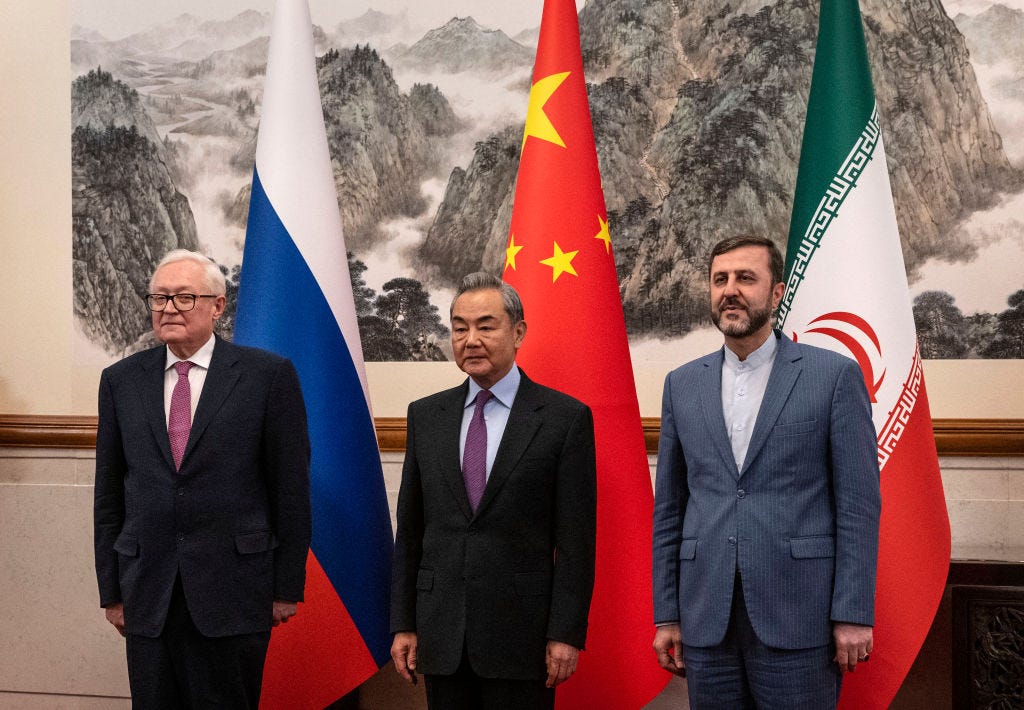The Real Lesson of the Iran-Israel War
When things get tough, authoritarian states leave each other in the lurch.

Over the past several years, one of the most important geopolitical developments has been the increasing cooperation between authoritarian states around the world. China and Russia have drawn much closer together economically and politically, as Beijing helps Moscow evade sanctions imposed after the invasion of Ukraine. The two countries are at the center of a global authoritarian axis which includes North Korea, Iran, and a constellation of other autocratic states.
This axis doesn’t cooperate on the basis of shared values or a common ideology, however, but rather on self-interest and mutual antipathy toward the United States and its allies. When China purchases Iranian oil or helps Nicolás Maduro’s dictatorship hold onto power in Venezuela, it doesn’t do so in the hopes of spreading Xi Jinping Thought. It is acting as a patron in an effort to build a coalition to counterbalance the West. Unlike Soviet era-alliances, authoritarian states today don’t need to be held together by an ideology: they just need to help each other evade sanctions, provide military support, and cooperate diplomatically in order to counterbalance the West.
The Ukraine war has brought members of the authoritarian axis together on the battlefield. Russia has launched over 8,000 Iran-developed Shahed kamikaze drones in Ukraine since the war began. North Korea has provided Russia with millions of artillery shells, ballistic missiles, and even 12,000 troops. While China hasn’t sent weapons to Russia directly, it has provided dual-use technology for circumventing sanctions, equipment such as semiconductors and machine tools, and satellite imagery.
However, these relations are fundamentally transactional, meaning there are hard limits on the support these states offer each other. A remarkable recent case in point is the limp Russian and Chinese response to joint Israeli and U.S. attacks on the Iranian nuclear program. In January, Russia and Iran signed a strategic partnership which encompasses various forms of military cooperation—from joint training to technical assistance. But despite Iran’s contributions to Russia’s war effort, Moscow all but abandoned Tehran as the country was bombarded by an Israeli air campaign that inflicted immense damage on its nuclear infrastructure, military leadership and assets, and government buildings. Vladimir Putin ignored Tehran’s request for new air defense systems (to replace the ones Israel destroyed earlier this year) and positioned himself as a mediator instead of an ally as warplanes pummeled Iran.
This isn’t the first time Putin has left a desperate ally in the lurch. With the collapse of the Syrian regime imminent last year, Russia would only offer asylum to Bashar al-Assad and his family. The fall of Assad was also a huge strategic defeat for Iran’s leaders, whose “ring of fire” of proxies in the region—particularly Hamas and Hezbollah—has been systematically wiped out by Israel. This lack of support has sent a powerful message to Russia’s friends around the world: when things get tough, they can’t rely on Moscow.
A similar pattern played out with China. Like Russia, China has strengthened ties with Iran in recent years—including a 25-year economic and political cooperation agreement signed in 2021. China, Russia, and Iran also conducted joint naval exercises earlier this year. Chinese state media claims that “Iran seeks to collaborate more closely with China … to counter U.S. hegemony and unilateralism.” But China’s willingness to “counter U.S. hegemony” didn’t extend to protecting Iran as the United States bombed its nuclear facilities.
As Stockholm School of Economics researcher Tino Sanandaji observes, Russia and China “exploit Iran’s isolation to get cheap natural resources while selling Iran second-rate military hardware at inflated prices, sometimes never even delivering the promised equipment.” Their relationships are short-term and contingent, and liable to be dropped at the first sign of trouble.
One lesson from the Iran-Israel war, then, is that alliances between democracies are far stronger than those between dictatorships. Unlike authoritarian transactionalism, liberal democracy inspires solidarity. After the Russian invasion of Ukraine, the United States and its European allies didn’t just support Kyiv to score a geopolitical victory—they supported Ukraine because it is a fellow democracy under siege from an imperialist dictatorship. Despite what initially appeared to be long odds that Ukraine could successfully defy the Russian war machine, democratic leaders around the world recognized that the war was the front line in the battle against global authoritarianism. Today, less than 20 percent of Ukraine is under Russian control—a number that has barely budged over nearly three and a half years of grinding attrition warfare. Meanwhile, Ukraine’s desire to join democratic institutions like the EU and NATO has never been stronger.
But if Trump’s decision to join the Israeli air campaign against Iran helped to expose the weakness of the bonds within the authoritarian axis, the rest of his foreign policy opens up the United States itself to the same criticism. Trump spent the first few months of his administration attempting to force Ukraine into accepting an abysmal deal with Russia which would have consigned millions of Ukrainians to life under permanent Russian occupation. Instead of recognizing that Putin isn’t interested in peace—he has always been clear that his central war aim is the complete destruction of Ukrainian sovereignty—Trump wants to wash his hands of the conflict altogether. Just like the Russian and Chinese relationships with their client states, Trump has turned the once-robust American commitment to Ukraine into a transaction.
All states act in their own self-interest, but the United States and its allies have spent 80 years building a liberal international order that revolves around democracy, individual rights, and the rule of law. Liberal democracies trust one another because they are open societies in which leaders are held accountable, economic and political relationships are grounded in transparent and enforceable rules, and the rights of citizens are respected. They understand the importance of upholding democratic norms around the world and preventing authoritarian states from trampling on those norms.
But despite the United States’ recent show of strength in Iran, Trump remains committed to an America First foreign policy that mirrors authoritarian transactionalism instead of challenging it. He wants to build a world that resembles the anarchic system of great power conflict that Russia and China are trying to restore. He doesn’t want to be constrained by the idea of a rules-based international order—he wants the freedom to threaten Denmark to gain control of Greenland or “take back” the Panama Canal. He wants to have unchecked authoritarian power in the United States. He wants to be capable of abandoning American allies whenever he wants.
Trump should heed the lesson that Iran’s leaders just learned the hard way: Democratic alliances are far stronger than the opportunistic ties between authoritarian states. At a time when global democratic solidarity has never been more vital to confront the authoritarian axis, it’s a tragedy that the world’s most powerful democracy is ruled by its very own authoritarian.
Matt Johnson is an essayist and the author of How Hitchens Can Save the Left: Rediscovering Fearless Liberalism in an Age of Counter-Enlightenment.
Follow Persuasion on Twitter, LinkedIn, and YouTube to keep up with our latest articles, podcasts, and events, as well as updates from excellent writers across our network.
And, to receive pieces like this in your inbox and support our work, subscribe below:






Excellent article. There is an unstated neoconservative premise: Free states need each other economically; so are more willing to help each other militarily. We do not bomb our customers and business partners, since we really are mutually dependent in a world of intentional comparative economic advantage. Authoritarian states do not see themselves as parts of a world community. Their comparative advantage is not developed in community with other states. In evolutionary terms authoritarian states are "cheaters", since they gain their best advantage by freeloading as much as possible. Free states on the other hand are generally punished for freeloading off their community of mutually dependent states. This is why Trump has been able to coerce NATO states to up their military spending. The punishment for military freeloading is generally understood by free states.
And isn't it fascinating that military prowess and democratic governments seem to accompany one another. General Mark Hertling observed that Russia's military will never match that of the United States because there is a foundation of trust upon which the US Military is based. Hertling saw first hand that trust is entirely absent from the Russian army. It is vitally important that Donald Trump be prevented from destroying that trust which is still present at some levels of the US Military.